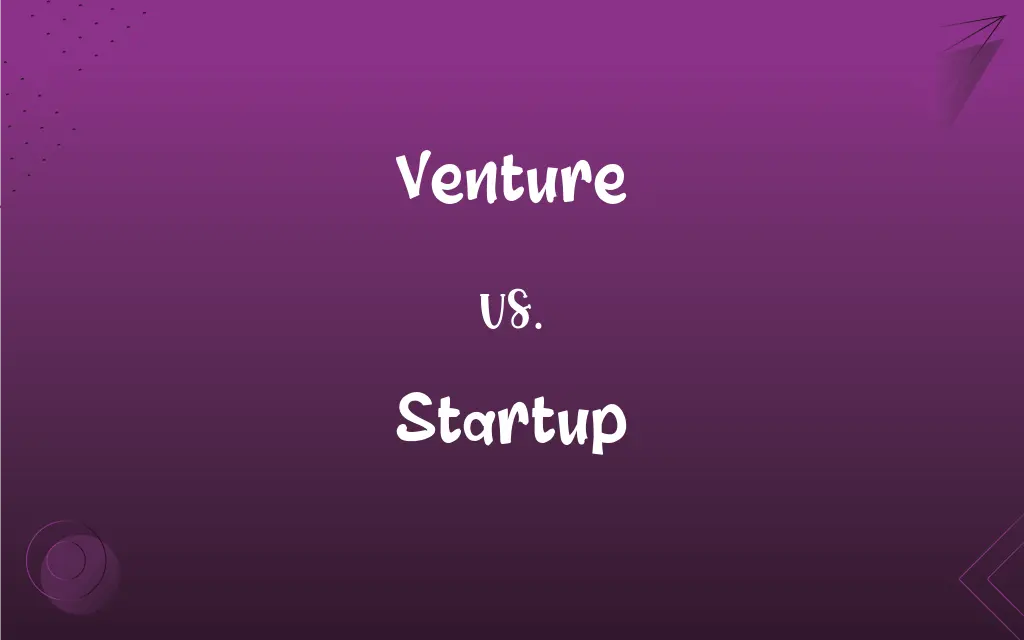Venture vs. Startup: What's the Difference?
Edited by Janet White || By Harlon Moss || Updated on November 16, 2023
Venture is a general term for a new business or project, often involving risk; startup specifically refers to a new, often tech-oriented company in its initial stages.

Key Differences
A venture refers broadly to any business endeavor or project, often characterized by risk and innovation. In contrast, a startup is a newly established business, typically focused on a unique or innovative product or service, often in the technology sector.
Ventures can encompass a wide range of business types and scales, from small enterprises to large-scale projects. Startups, however, are generally associated with rapid growth potential and scalability, especially in emerging industries.
The term venture can be used in various contexts, including joint ventures or venture capital, reflecting a broader scope. Startups are often linked with entrepreneurial culture, aiming to disrupt traditional markets or introduce novel solutions.
Ventures may not always be technology-oriented and can include traditional business models. In contrast, startups are typically heavily reliant on technology and aim to leverage it for market innovation.
Investment in a venture can come from various sources and doesn't necessarily imply a particular stage of business. Startups often seek funding through venture capital, angel investors, or crowdfunding, especially in their early stages.
ADVERTISEMENT
Comparison Chart
Definition
A new business or project with potential risk
A new company in its initial stages, often tech-focused
Scale
Can vary widely in size and scope
Typically aims for rapid growth and scalability
Context
Broader scope, includes various business types
Often associated with innovation and technology
Orientation
Not necessarily tech-focused
Heavily reliant on and driven by technology
Funding
Diverse sources, stage-independent
Often involves venture capital, angel investors in early stages
ADVERTISEMENT
Venture and Startup Definitions
Venture
Risk-taking Endeavor.
Investing in this venture involves significant risk.
Startup
Venture Seeking Growth.
Their startup is attracting significant venture capital.
Venture
New Business Project.
They launched a venture in renewable energy.
Startup
Innovative Enterprise.
They founded a startup that revolutionizes online education.
Venture
Entrepreneurial Project.
Her latest venture is a boutique hotel.
Startup
New Tech Company.
Their startup focuses on AI-driven analytics.
Venture
Joint Enterprise.
They entered a joint venture with an international company.
Startup
Early-Stage Business.
The startup just completed its first year in operation.
Venture
Speculative Activity.
He's known for his profitable investment ventures.
Startup
The act or process of setting into operation or motion.
Venture
An undertaking that is dangerous, daring, or of uncertain outcome.
Startup
A business or undertaking that has recently begun operation
Grew from a tiny startup to a large corporation.
Venture
A business enterprise involving some risk in expectation of gain.
Startup
The act or process of starting a process or machine.
Venture
Something, such as money or cargo, at hazard in a risky enterprise.
Startup
A new company or organization or business venture designed for rapid growth.
Startup
A folder (especially in Windows), containing shortcuts of applications or programs that start up automatically after a user signs in.
Startup
A kind of high-low or thigh-high boot worn by rustic people.
Startup
A kind of gaiter or legging.
Startup
(obsolete) One who comes suddenly into notice; an upstart.
Startup
The act of setting in operation;
Repeated shutdowns and startups are expensive
Startup
The act of starting a new operation or practice;
He opposed the inauguration of fluoridation
The startup of the new factory was delayed by strikes
Startup
Entrepreneurial Technology Firm.
His startup develops eco-friendly packaging solutions.
FAQs
Is a startup always tech-based?
Startups are often tech-based but can be in other innovative sectors.
Are all startups considered ventures?
Yes, startups can be considered a subset of ventures.
Do startups always aim for rapid growth?
Generally, startups aim for rapid growth and scalability.
What defines a venture?
A venture is any new business or project, often involving risk.
Do startups always involve innovation?
Startups typically focus on innovation, especially in technology.
Can a venture be a large project?
Yes, ventures can range from small to large-scale projects.
Can a venture involve partnerships?
Ventures can include partnerships, like joint ventures.
Do startups require substantial initial investment?
Startups often require significant investment, but this varies.
Can ventures be non-technological?
Ventures can include both technological and non-technological projects.
Can a venture be a one-time project?
Yes, a venture can be a one-time or ongoing project.
Can ventures be purely investment focused?
Some ventures are primarily investment-focused.
Do ventures always involve high risk?
Ventures often involve risk, but the level can vary.
Can ventures be part of established companies?
Yes, established companies can also undertake new ventures.
Is venture capital exclusive to startups?
No, venture capital can be invested in various types of ventures.
Is crowd funding common for startups?
Crowdfunding is a popular funding method for startups.
Are all new businesses considered startups?
Not all new businesses are startups, as startups imply innovation and growth potential.
Is entrepreneurial spirit crucial for startups?
Entrepreneurial spirit is typically central to startup culture.
Do startups always use new technologies?
Startups often leverage new technologies, but it's not a strict requirement.
Are ventures limited by industry?
Ventures can span a wide range of industries and sectors.
Are startups limited to small companies?
Startups are usually small but aim to grow significantly.
About Author
Written by
Harlon MossHarlon is a seasoned quality moderator and accomplished content writer for Difference Wiki. An alumnus of the prestigious University of California, he earned his degree in Computer Science. Leveraging his academic background, Harlon brings a meticulous and informed perspective to his work, ensuring content accuracy and excellence.
Edited by
Janet WhiteJanet White has been an esteemed writer and blogger for Difference Wiki. Holding a Master's degree in Science and Medical Journalism from the prestigious Boston University, she has consistently demonstrated her expertise and passion for her field. When she's not immersed in her work, Janet relishes her time exercising, delving into a good book, and cherishing moments with friends and family.































































